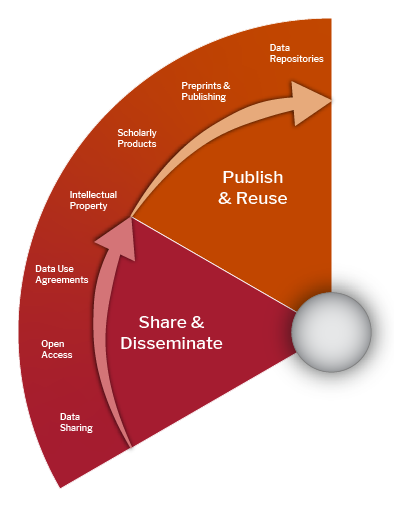Sharing & Reusing Data
Data sharing is essential for expedited translation of research results into knowledge, products and procedures to improve human health.
In the last decade, it has become increasingly common for researchers to make their data available to others when they complete a study. This is usually referred to as data sharing or data publishing. Data sharing is growing mostly due to recent data policies from journals and funders. This section will help you:
- Comply with requirements for Data Sharing through designated or general Data Repositories.
- Explore ways you can expand your contributions to the scientific through publishing, sharing and receiving credit for all types of Scholarly Products.
- Understand new avenues in scholarly communication in Preprints & Publishing.
Top Things You Need to Know
Journal Requirements
Sharing data in a repository- Many journals require that published articles be accompanied by the underlying research data
- Data sharing policies often are found in the instructions for authors
- Be sure to determine if your journal specifies where and how you should share your data.
Confidentiality
Comply with IRB and Informed Consent- HMS regulations: Harvard Longwood Area researchers conducting human subject research should consult the Office of Human Research Administration (OHRA) and The Institutional Review Board Operations (IRB) in planning for data management and sharing
- Health research regulations: Researchers need to adhere to privacy law regarding personal health information. See the The Health Insurance Portability and Accountability Act of 1996 (HIPAA)
- Informed consent: Researchers should include a provision for data sharing.
- Maintaining confidentiality: Data made publicly available should not contain information that could risk the confidentiality of their participants.
Intellectual Property
Understand data, copyright, and licensingReview Intellectual Property to understand:
- Sharing data that you have produced or collected yourself
- Sharing data that you have collected from other sources
- Applying appropriate licenses to your shared work
Data Use Agreements
Controlling the use of research data- A Data Use Agreement (DUA) should be used when transmitting or receiving any data and there is a need to control the use, transfer, storage, and/or disclosure of the data.
- For example, a DUA would be required when transferring human subjects data, even it is de-identified, to ensure compliance with the signed consent forms and that appropriate information security measures are in place at the receiving institution.
- The Office for Sponsored Programs and Office of Research Administration are the authorized DUA signatories for Harvard
NIH Data Sharing Policy & Public Access Policy
Policies for open scienceThe National Institutes of Health (NIH) has a number of policies related to public access and data sharing, including:
- Public Access Policy: Requires investigators funded by the NIH to submit their final, peer-reviewed manuscripts to PubMed Central
- Data Management and Sharing Policy: Requires awardees to manage and share data as outlined in approved plans